Physical Address
304 North Cardinal St.
Dorchester Center, MA 02124
Physical Address
304 North Cardinal St.
Dorchester Center, MA 02124
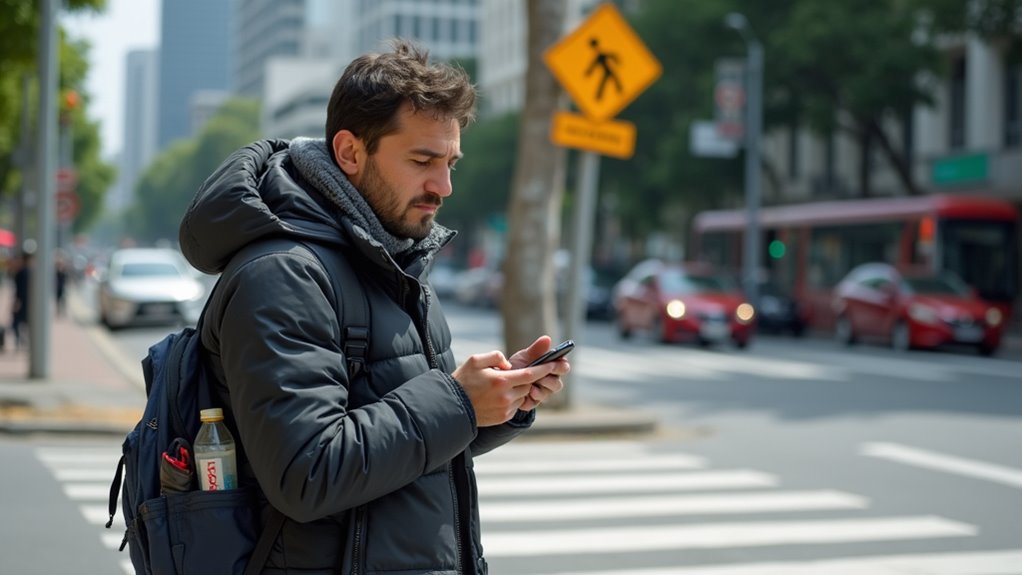
Knowing Singapore's strict laws can save your vacation, but which common tourist mistake could land you in jail?
When visiting Singapore, avoid littering (fines up to S$10,000), chewing gum, smoking outside designated areas, and bringing drugs (zero-tolerance policy). Don’t point with fingers (use open palm), eat on public transit, connect to unsecured Wi-Fi, or tip at restaurants. Skip going nude in private spaces visible to others, criticizing religions, or staying only in tourist areas. These simple precautions will help you navigate Singapore’s strict laws and cultural norms with ease.
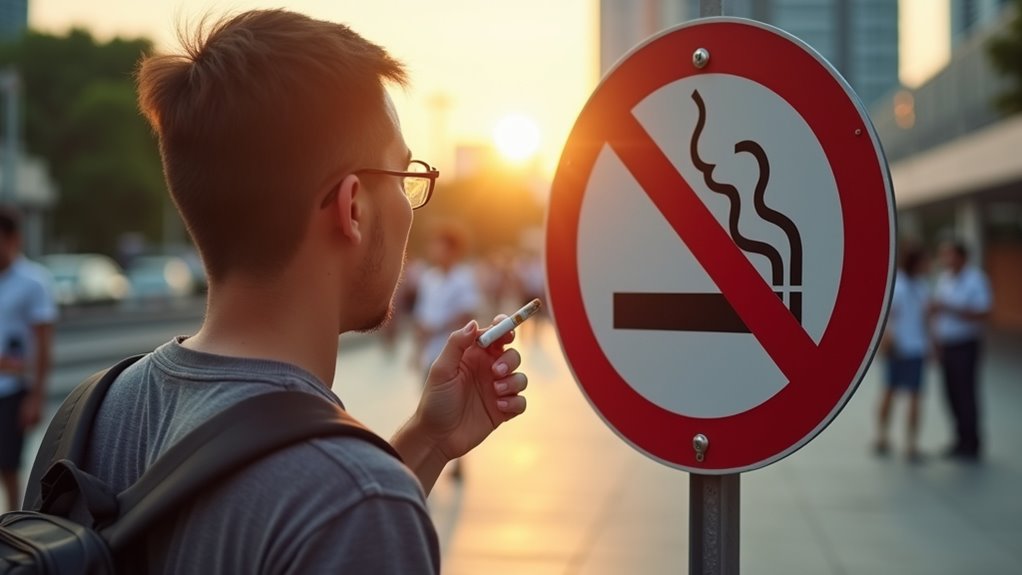
Singapore’s squeaky-clean reputation comes with strict laws that catch many travelers off guard. The city-state enforces some of the world’s strictest regulations, with severe penalties including caning for vandalism and even death for drug trafficking.
Never leave the scene of an accident—you’re required to report incidents to police within 24 hours. When driving across borders, secure proper vehicle permits through OneMotoring in advance.
Always keep your belongings secure, especially at Changi Airport, MRT stations, and tourist hotspots like Clarke Quay. Be cautious of venomous wildlife that inhabit the island, including dangerous snakes and insects. All smoking in public is prohibited except in designated areas marked with yellow signs, with fines ranging from SGD 200 to 1000 for violations.
Protect yourself from ATM skimming by using bank machines and covering your PIN. Avoid unofficial currency exchangers, and verify prices before purchasing.
During haze season (June-October), consider wearing N95 masks if air quality deteriorates.
While enjoying Singapore’s pristine streets, you should know that littering comes with stiff penalties. First-time offenders face fines up to S$1,000 for small items, while improperly disposing of bulky waste like furniture can cost you S$5,000. Repeat offenders risk fines up to S$10,000.
Singapore takes its cleanliness seriously, with enforcement officers conducting regular inspections of public spaces. In 2018 alone, authorities issued over 39,000 tickets for littering offenses. Remember that not flushing public restroom toilets is also considered an offense under Singapore’s strict cleanliness laws.
Singapore’s meticulous cleanliness approach results in thousands of littering fines annually through vigilant enforcement.
Beyond fines, you might receive a Corrective Work Order or even jail time for severe violations. If you’re staying in one of Singapore’s budget-friendly neighborhoods, these rules apply equally throughout the city regardless of location.
The Environmental Public Health Act provides the legal framework for these regulations. Always use designated bins and dispose of waste properly to avoid unwanted expenses that could ruin your trip.
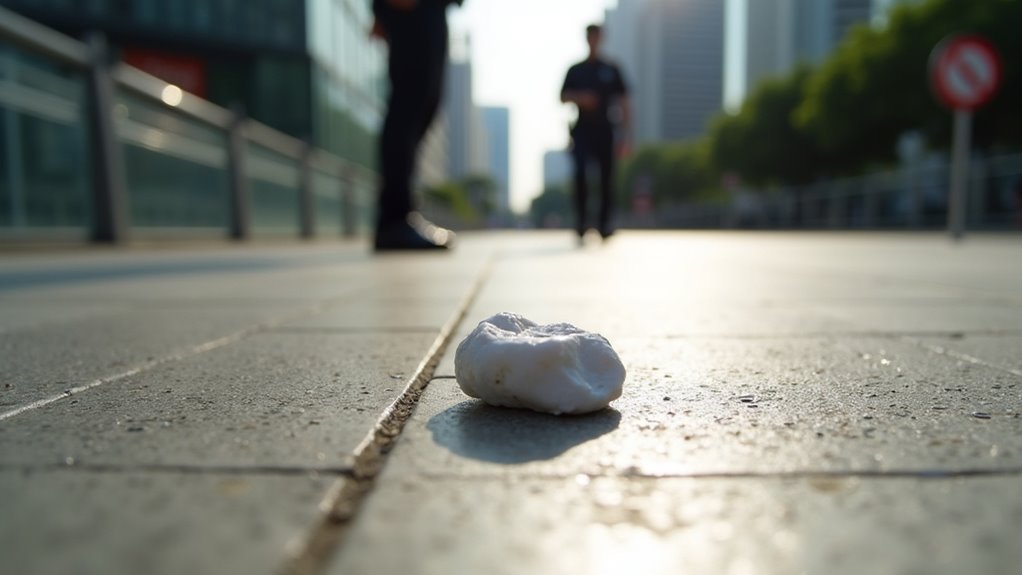
Perhaps the most notorious rule foreigners associate with Singapore is its strict stance on chewing gum. The ban, implemented in 1992 to combat litter and infrastructure damage, remains largely in effect today. You can’t purchase regular gum in stores, and importing it’s prohibited except for therapeutic purposes with a prescription.
While simply possessing or chewing gum isn’t technically illegal, it’s best avoided to prevent any misunderstandings:
This restriction has dramatically reduced cleaning costs and eliminated gum-related damage to public transportation systems. Unlike Laos where visitors must watch for deadly animals, Singapore’s main concerns are cleanliness and infrastructure preservation. The ban was initially motivated by vandals using gum to disrupt the MRT system by sticking it on train door sensors, causing operational delays and maintenance issues.
Strict enforcement of smoking regulations in Singapore means you’ll need to be vigilant about where you light up. Smoke only in clearly marked Designated Smoking Areas (DSAs), identifiable by overhead signs or ground markings. Every other public space is off-limits, including bus stops, pedestrian bridges, and residential corridors.
Hospital grounds and healthcare facilities are completely smoke-free with no exceptions. Universities allow smoking only in specific DSAs. Even if you’re unaware of the rules, you’ll face immediate fines for violations. Remember that the legal smoking age is now 21 years old, following increases from 18 years between 2018-2021.
The penalties get worse if you’re caught with duty-unpaid cigarettes, which lack the “SDPC” stamp.
First-time littering of cigarette butts costs you $200, with repeat offenses reaching $10,000. NEA officers can issue on-the-spot fines and don’t accept ignorance as an excuse. If you’re planning to visit the Philippines after Singapore, you’ll find more relaxed smoking regulations in destinations like Cebu or Manila.
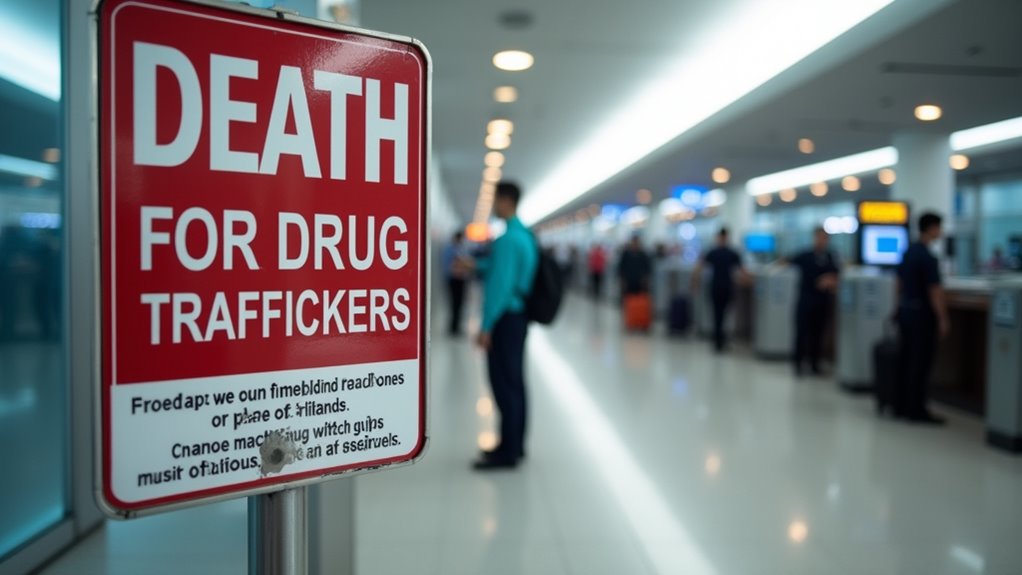
Singapore’s zero-tolerance approach to drugs makes its smoking regulations look lenient by comparison. The death penalty applies for trafficking methamphetamine exceeding 250 grams, and even lesser drug offenses result in lengthy imprisonment. Between October 2024 and February 2025 alone, eight people were executed for drug crimes.
For your safety, follow these critical precautions:
Singapore remains one of only five countries worldwide that carried out executions for drug-related offenses in 2024.
While Singapore’s culinary scene offers rich flavors similar to Tibetan food culture, all substances must be legal and properly declared.
Claiming ignorance of these laws won’t protect you. Singapore authorities prosecute drug offenses vigorously, regardless of nationality or intent. The consequences—including capital punishment—are simply not worth the risk.
While you might be tempted to walk around your hotel room or Airbnb unclothed, don’t assume your privacy is protected in Singapore. Public nudity laws extend to private accommodations if you’re visible to others outside. Being naked near uncovered windows can result in fines up to $2,000 or three months’ imprisonment.
Singapore’s multicultural society highly values modesty and decency. Your neighbors won’t hesitate to report you if they spot you in the nude. In fact, there was a precedent in 2009 when a man was fined for being naked in his own flat when neighbors could see him. This strict approach to public decency is quite different from the more relaxed atmosphere you might find in South Korean cities like Seoul or Busan.
Even if you’re used to walking around naked at home, always close your curtains or blinds in Singapore.
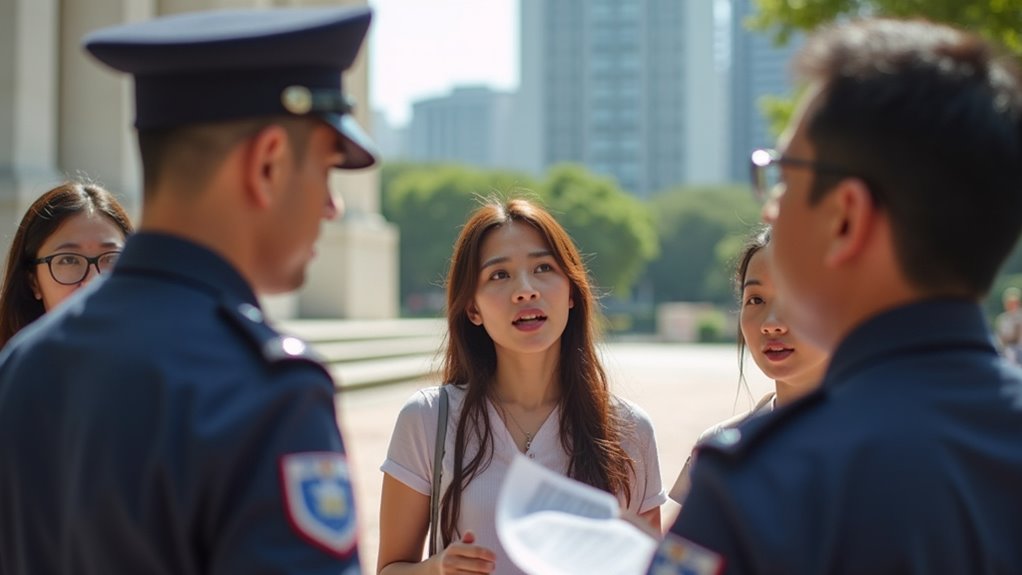
Freedom of speech has notable limitations in Singapore, especially regarding politics and religion. The country prioritizes social harmony and has strict laws against speech that could disrupt public order or offend religious sensibilities. When visiting, keep your stronger opinions to yourself.
Singapore values harmony over free expression, requiring visitors to exercise caution with political and religious commentary.
Despite its compact size, Singapore ranks among the world’s most expensive cities, catching many travelers off guard with its steep costs. Accommodation will consume your largest chunk of budget—central apartments start at S$2,500 monthly, while decent hotels run S$250-500 nightly.
Transportation expenses add up quickly too. While public transit costs S$100-150 monthly, taxis and ride-shares charge 3-5 times more, especially during peak hours. Entertainment options can significantly impact your budget with lifestyle choices determining whether you spend modestly or extravagantly during your visit.
Don’t underestimate food variability—hawker centers offer meals for S$5-10, but restaurant dining averages S$25-50 per person, with alcohol prices substantially higher than neighboring countries. Often described as the Garden City, Singapore’s natural attractions can offer budget-friendly alternatives to costly tourist destinations.
Remember to factor in Singapore’s hidden fees: 8% GST, 10% service charges, and tourist attraction surcharges.
Save money by purchasing transport passes, eating at hawker centers, and avoiding peak travel periods.
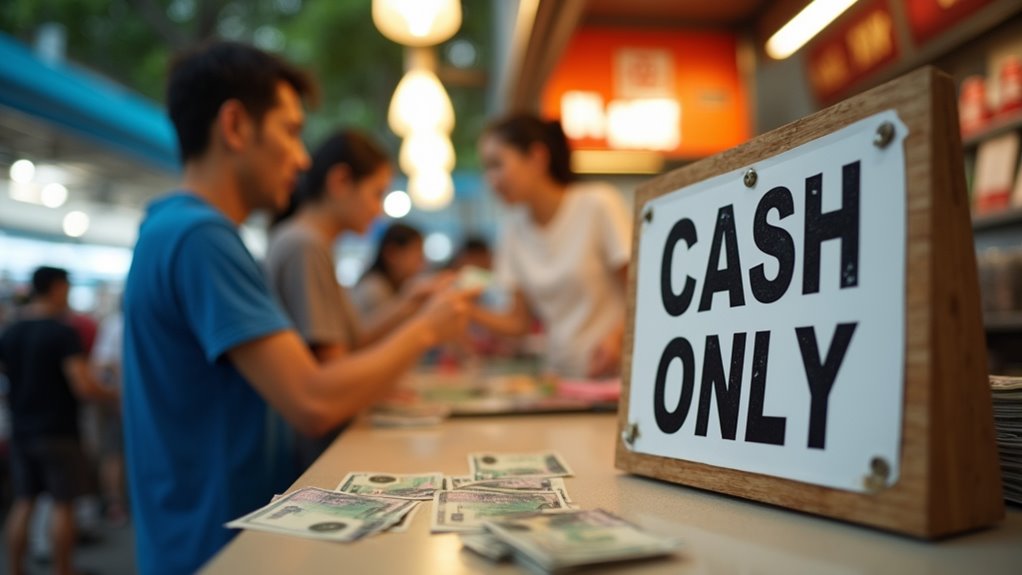
Relying solely on credit cards in Singapore can leave you stranded at critical moments, despite the city-state’s modern reputation. Many hawker centers, traditional markets, and older taxis operate on cash-only policies, particularly for transactions under SGD 10.
Carry sufficient cash alongside your cards to avoid payment frustrations throughout your visit.
Singapore’s strict regulations on public transportation prohibit more than just littering—they ban all food and drink consumption without exception. This includes water, coffee, snacks, and even chewing gum, which is separately prohibited nationwide.
The ban extends to all stations (except designated eating areas), MRT, LRT, and buses. Don’t assume you can take a quick sip when no one’s looking; CCTV surveillance and staff monitoring are constant. The MRT system handles approximately 3 million passengers daily while maintaining impeccable cleanliness standards. Unlike in China where some flexibility exists in transportation rules, Singapore enforces its public transit etiquette with absolute consistency.
Violations carry fines up to $500 SGD, with no exemptions for travelers or first-timers. The rule applies 24/7 to everyone regardless of age.
Plan accordingly by finishing your meals before entering stations, using designated eateries, or carrying sealed containers without consuming their contents. Schedule hydration breaks around your transit journeys.
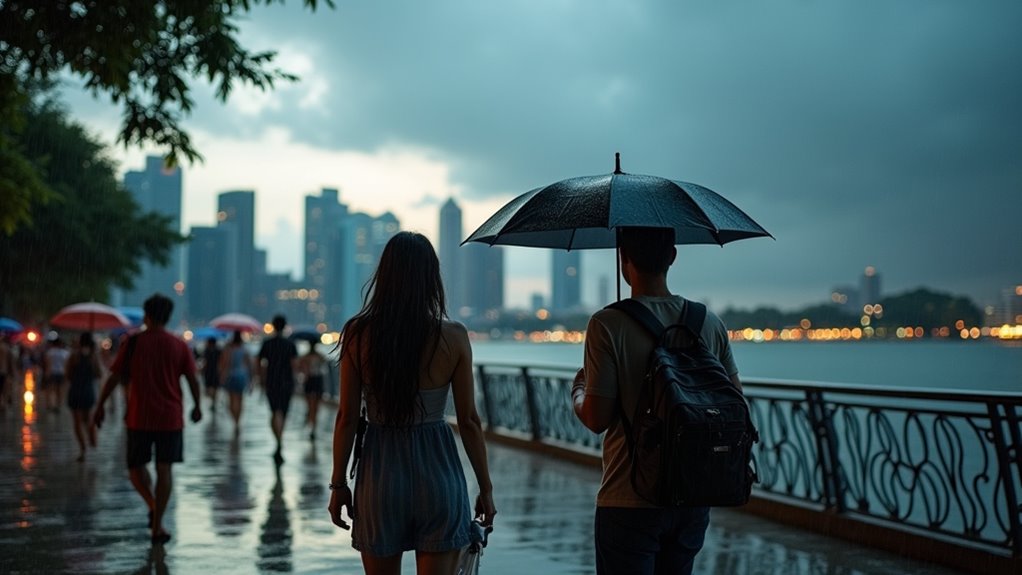
While many travelers focus on Singapore’s attractions and cuisine, they often overlook the island’s rapidly changing weather patterns. Singapore’s climate has become increasingly unpredictable, with temperatures rising by 0.25°C per decade and annual rainfall increasing by 78.1 mm per decade since 1980.
Visitors beware: Singapore’s climate shift brings rising temperatures and increased rainfall, a critical factor in planning your trip.
To protect yourself from sudden weather shifts:
When exploring natural areas in Singapore, be aware that some venomous snake species found in Malaysia can occasionally be encountered in Singapore’s nature reserves and parks.
In many Western cultures, pointing is a casual gesture, but in Singapore, it’s considered deeply offensive and disrespectful across all ethnic communities. This is especially true when directed at elders, as Singaporean culture highly values seniority.
Instead, use an open palm or closed hand with thumb extended when indicating direction. To call someone, keep your palm down with fingers fluttering lightly. When in crowded areas, be extra mindful to avoid accidental pointing.
This sensitivity extends across religious boundaries—Hindus, Malay Muslims, and Buddhist traditions all consider pointing inappropriate. Also avoid pointing with your feet, which is equally offensive. Unlike Korea where you need to watch for dangerous wildlife, Singapore’s main concerns are cultural sensitivities rather than deadly animals.
In business settings, pointing can be interpreted as confrontational. Being aware of proper body language is crucial when interacting with locals in both casual and formal environments. Maintain arm’s length distance while gesturing and use head tilts as a polite alternative.
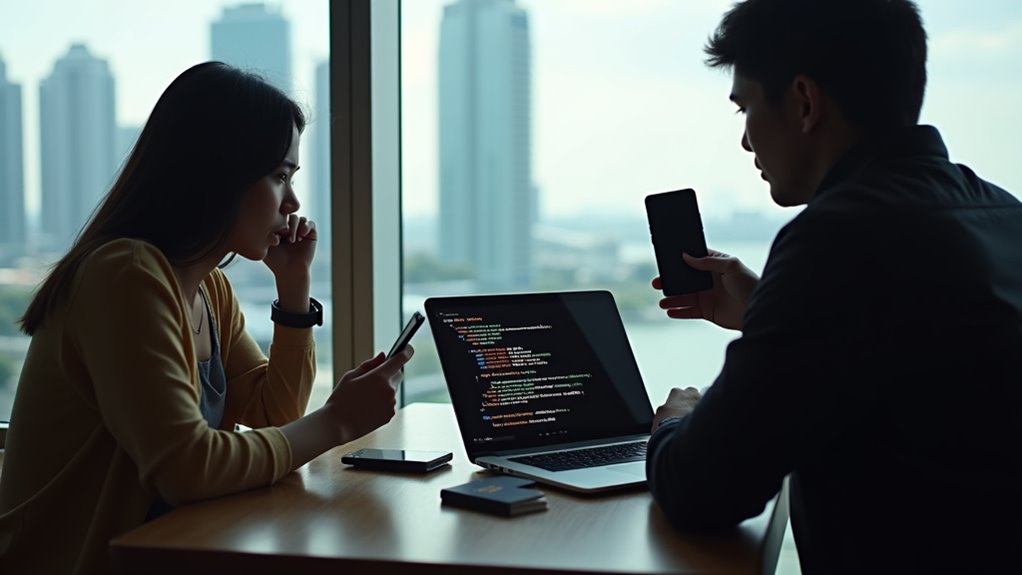
Public Wi-Fi networks throughout Singapore might seem convenient, but they pose serious security risks to unwary travelers. While Singapore offers free Wi-Fi in many public spaces, connecting to these unsecured networks could expose your personal data to cybercriminals.
To protect yourself while staying connected:
While enjoying Singapore, many travelers take time to explore Malaysian cuisine just across the border, making secure internet even more important for planning day trips.
Singapore’s cybersecurity authorities regularly warn about Wi-Fi vulnerabilities that could lead to identity theft or financial fraud. Instead of relying on free public Wi-Fi, consider using 5G technology which offers superior security features and faster performance for all your connectivity needs.
Unlike many Western countries, Singapore doesn’t have a strong tipping culture, so you won’t need to factor gratuities into your travel budget. Most restaurants and hotels already include a 10% service charge in your bill, making additional tipping unnecessary.
If you receive exceptional service and want to show appreciation, leaving 5-10% or rounding up your bill is sufficient but never obligatory. Taxi drivers don’t expect tips and might even be surprised if you insist they keep the change. This is quite different from tropical destinations like Bali, where tipping is more customary and appreciated.
For hotel porters, S$1-2 per bag is appreciated but not expected.
Remember that service staff in Singapore are generally well-compensated compared to countries where tipping supplements income. Respecting local customs means understanding when not to tip—it’s perfectly acceptable to pay exactly what’s on your bill. Tipping is actually prohibited by law at Singapore’s airports, so avoid offering gratuities to airport staff.
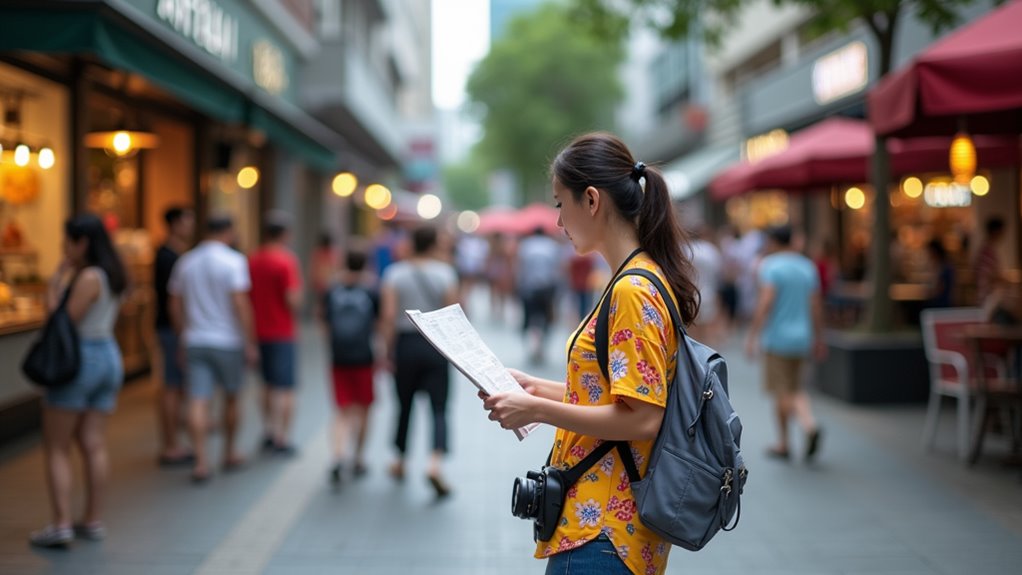
While knowing when not to tip helps your wallet, limiting yourself to Singapore’s famous attractions could cost you the authentic experience you’re seeking. The island nation’s vibrant cultural tapestry extends far beyond Marina Bay Sands and Gardens by the Bay, where you’ll mostly encounter inflated prices and overwhelming crowds.
Venture beyond Singapore’s postcard landmarks to discover the authentic heartbeat of this culturally rich island nation.
You’ve got all the insider tips to avoid Singapore’s biggest tourist traps and legal pitfalls. Remember, there’s absolutely zero wiggle room with drug laws, and even dropping a candy wrapper could cost you hundreds. Don’t waste your trip in tourist zones when the real Singapore awaits in local neighborhoods. Follow these rules and you’ll have an incredible adventure without ending up with a fine or worse!